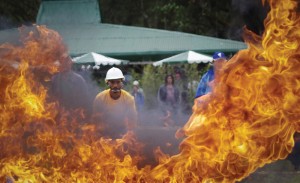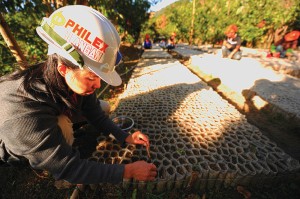Keeping the pledge of ‘responsible mining’

MINE SAFETY TILT A member of a mining company’s firefighting unit prepares for a mine safety field competition in Baguio City as part of this year’s National Mine Safety and Environment Week celebration. RICHARD BALONGLONG
A Nueva Vizcaya town mayor has a dream—that his fourth-class upland farming town (annual income: P25 million-P35 million) becomes first class (P55 million) in the future. And the way to achieve this, he said, is through mining.
“Shall we just sleep on our God-given minerals and leave these untouched or shall we use these to help improve the lives of our people?” asked Quezon Mayor Aurelio Salun-at.
Salun-at spoke last week at the 59th National Mine Safety and Environment Conference in Baguio City, which was organized by the Philippine Society of Mining Engineers (PSME) and the Philippine Mine Safety and Environment Association (PMSEA).
Quezon (population: 20,000) is host to the Runruno mining project of Metal Exploration PLC (Metals Ex), a London-based company. The 3,091-hectare project in Runruno, one of Quezon’s 12 villages, is targeted to produce mainly gold and molybdenum (besides other metals like manganese) by the second half of 2013.
The company has confirmed that the project could produce a yearly average of 96,700 ounces of gold over a mine life of 10.4 years and 900,000 pounds of molybdenum.
Despite the opposition, the project, Salun-at said, would bring revenue and jobs for the country. “Do you want our country to remain backward and undeveloped?” he asked, taking a jab at critics who, he said, included several Catholic priests and nuns.
A poor barangay, Runruno, he said, could not afford basic social services such as preschool education and clinics.
But shortly after its entry in 2005, the mining company has since been providing the honorariums for 22 day-care teachers and for some nurses, funds for infrastructures such as hanging bridges and clinics, and scholarships for some children, he said.
Salun-at said small-scale miners are the ones creating problems because they use toxic chemicals, such as mercury and cyanide.
The bottom line is “responsible mining,” to which, he said, mining companies are committed. “Let history judge us for supporting responsible mining,” he said.
Over a century of mining
A Benguet official acknowledged that the mining industry, which has been operating for over a century in the province, and the vegetable industry have been the backbone of Cordillera’s economy.
“We see the mining industry as good for us. But other things happened when the industry was at its lowest,” said Vice Gov. Cresencio Pacalso.
Also speaking at the mine and safety conference last week, Pacalso was referring to the 1990s when many companies closed as a result of a slump in metal prices. Many workers lost their jobs and were practically left to fend for themselves as a result.
When such crisis happens, companies must be “like a family man who must be prepared and be responsible enough to take care of his children,” he said.
He cited the experience of Philex Mining Corp., one of the oldest companies in the province. He said he “grew up with the company” and saw its good relations with the community and workers.
But he considered “an unfortunate accident” the breach in the company’s tailings pond in Padcal in Itogon town at the height of strong typhoons in August.
Still, Pacalso issued some gauge of the mining industry’s commitment to responsible mining.
“We must ensure that the community we would leave behind must be a better place than when we came in,” he said.
In a speech during a forum on mining and development organized by Diwata, a nongovernment organization of women in mineral resource development, a top South African official said mining in the Philippines needs a policy that stresses socioeconomic responsibility and pushes more equitable sharing of wealth.
Good, bad sides
Godfrey Oliphant, deputy minister of mineral resources of South Africa, said his country’s mining charter, which was enacted in 2002, is a necessary tool to rein in both the good and bad sides of mining.
“In South Africa, we say that mining has good, bad and ugly sides,” he said in a Nov. 14 forum.
Oliphant asked forum participants to “take the best of what is mining and do not repeat the mistakes like what we have made.”

REFORESTATION A Philex Mining Corp. employee tends to pine saplings that would be used in the company’s reforestation activities in Benguet. EV ESPIRITU
“For the first time in the history of our country, we saw the recognition of the country’s minerals as belonging to its people and the vesting of the custodianship of mineral resources to the state instead of individual ownership as was the case before,” he said.
Later in his keynote speech during the mine safety and environment conference, Oliphant again stressed responsibility in mining operations.
He told the participants, composed of executives and representatives of the country’s mining companies, that mining should always benefit people and families.
Responsible mining is something that develops the economy and its people and recognizes the delicate balance between mining and the environment, he said. Responsibility in mining, he added, gives priority to the health and safety of workers and surrounding communities.
This year marks the 10th anniversary of the Mineral and Petroleum Resources Development Act (MPRDA) of 2002, which Oliphant described as a landmark piece of legislation.
“At once, the MPRDA recognized the country’s mineral wealth as belonging to all of South Africa’s people and the trusteeship of which transferred to the state,” he said.
“The conclusion of the recent bilateral consultative forum agreement between our two countries will provide the framework for a more structured relationship in various fields, including mineral and industrial development. It is my sincere hope that during my visit in the Philippines, we will be able to explore opportunities in this promising field and build mutually beneficial relations,” Oliphant said.
South Africa will share technologies with the Philippines to push mining safety and environmental protection.
“This is our collective responsibility and it will arise from our collective choices today. This is not just a moral obligation, the competitiveness of the modern mining industry will, to a large extent, depend on the degree to which it adopts green technologies and sound environmental practices,” Oliphant said.














